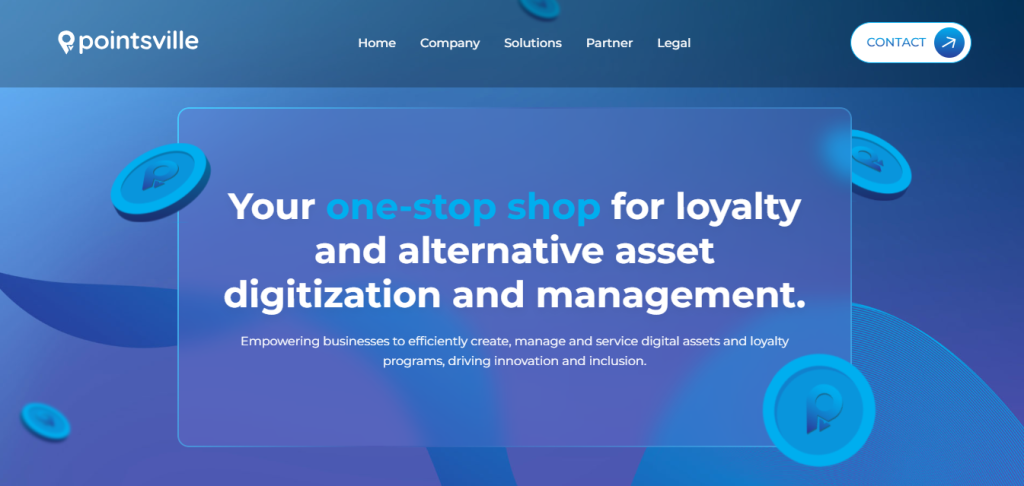Pointsville Secures Series A Funding to Redefine Loyalty in the Digital Economy
September 13, 2025
byFenoms Startup Research

Pointsville, a rising startup focused on reinventing how loyalty and rewards programs operate in the digital economy, has announced its Series A funding round led by an impressive syndicate of investors. The round includes Valor Capital Group, Tether, Itaú Unibanco’s, Nubank’s co-founder, Superscrypt, SNZ, Credit Saison, K2 Integrity, Citrino, and Dynamo’s partners.
Founded by Gabor Gurbacs, Pointsville is addressing one of the most persistent challenges in consumer engagement: the fragmented and outdated nature of loyalty ecosystems.
What Pointsville Does
For decades, loyalty programs have been central to customer retention strategies, but they have largely failed to evolve. Consumers juggle multiple programs across airlines, retailers, and financial services, only to discover that their points are locked in silos with little flexibility. Businesses, meanwhile, pour resources into these systems without gaining the deeper customer insights they need.
Pointsville is building a next-generation loyalty infrastructure powered by blockchain and digital assets. The platform makes loyalty points interoperable, tradable, and more valuable, allowing customers to redeem or transfer rewards seamlessly across multiple ecosystems. For businesses, this creates new pathways to capture customer attention while gathering meaningful behavioral data.
The idea is bold but practical: transform loyalty from a closed, static model into a dynamic, tokenized marketplace.
Why This Funding Round Matters
While the funding amount was undisclosed, the breadth of investors is telling. Having both fintech giants like Tether and banking leaders such as Itaú Unibanco on board reflects the broad appeal of Pointsville’s mission. The inclusion of Nubank’s co-founder and Valor Capital Group further strengthens its ties to Latin America, one of the fastest-growing fintech regions in the world.
The global loyalty management market, valued at $5.5 billion in 2022, is projected to grow to $28.6 billion by 2031, at a CAGR of nearly 20% (Allied Market Research). At the same time, consumer dissatisfaction is high—75% of U.S. consumers report frustration with loyalty programs due to complexity and lack of value (Bond Loyalty Report).
This disconnect highlights why investors see Pointsville as a potential category leader.
Why It Matters Now
Commerce is shifting rapidly toward digital-first, cross-border interactions. Traditional loyalty programs, built for single companies or industries, can’t keep pace with customers who expect personalization and flexibility across every transaction.
Recent research underscores this shift:
- McKinsey found that companies with strong loyalty programs generate 2.5x higher revenue growth than competitors.
- PwC reported that 82% of consumers are willing to share more personal data in exchange for better loyalty benefits.
- Juniper Research predicts blockchain-based loyalty programs could save businesses $19 billion annually by 2025, mainly by cutting fraud and reducing operational costs.
- Statista estimates that by 2026, 5.2 billion people worldwide will use digital wallets, creating a natural gateway for tokenized loyalty systems.
Where the Real Disruption Lies
Pointsville’s insight isn’t just about digitizing loyalty—it’s about rethinking its very structure. The company recognized that points aren’t failing because customers don’t value them; they’re failing because the value is locked.
That’s the deeper lesson here: the most powerful startups don’t create value from scratch—they unlock value that was already there but trapped in outdated systems. In loyalty, points have traditionally been closed assets, redeemable in narrow channels. By making them liquid, transferable, and borderless, Pointsville shifts loyalty from a marketing perk to a new form of digital currency.
For founders, this lesson cuts across industries. When a system has high engagement but low satisfaction, the problem isn’t adoption—it’s accessibility. The opportunity lies in removing friction so users can tap into the full potential of what they already have. Pointsville didn’t invent loyalty; it reinvented the rules so loyalty could actually work for both sides of the equation.
Industry Outlook and Market Potential
Pointsville is entering a sector on the cusp of major transformation:
- Global Loyalty Growth: The loyalty management market will surge from $5.5 billion in 2022 to $28.6 billion by 2031 (Allied Market Research).
- Blockchain Integration: By 2030, blockchain adoption in loyalty and rewards is expected to represent a multi-billion-dollar market, driven by fraud prevention and interoperability.
- Consumer Trends: The Bond Loyalty Report notes that 79% of consumers prefer brands with easily redeemable or transferable rewards.
- Fintech Synergy: As digital wallets grow to 5.2 billion users by 2026 (Statista), tokenized loyalty assets will find ready-made distribution channels.
- Cross-Border Commerce: With global e-commerce projected to surpass $8 trillion by 2026 (eMarketer), cross-border loyalty will become increasingly important for retailers and financial services alike.
By aligning with these trends, Pointsville is not only modernizing loyalty programs but positioning itself at the center of a much larger shift in digital finance and consumer engagement.
What’s Next for Pointsville
With Series A funding secured, Pointsville will scale its platform, expand partnerships, and integrate with digital wallets and fintech providers. Building strong use cases across retail, banking, and travel will be key to proving its model.
The company’s long-term goal is ambitious: to become the infrastructure layer for global loyalty programs, transforming points into a universal, tokenized asset class that consumers and brands can trust.
If successful, Pointsville won’t just disrupt loyalty—it could help redefine how everyday value is earned, exchanged, and experienced in the digital economy.









